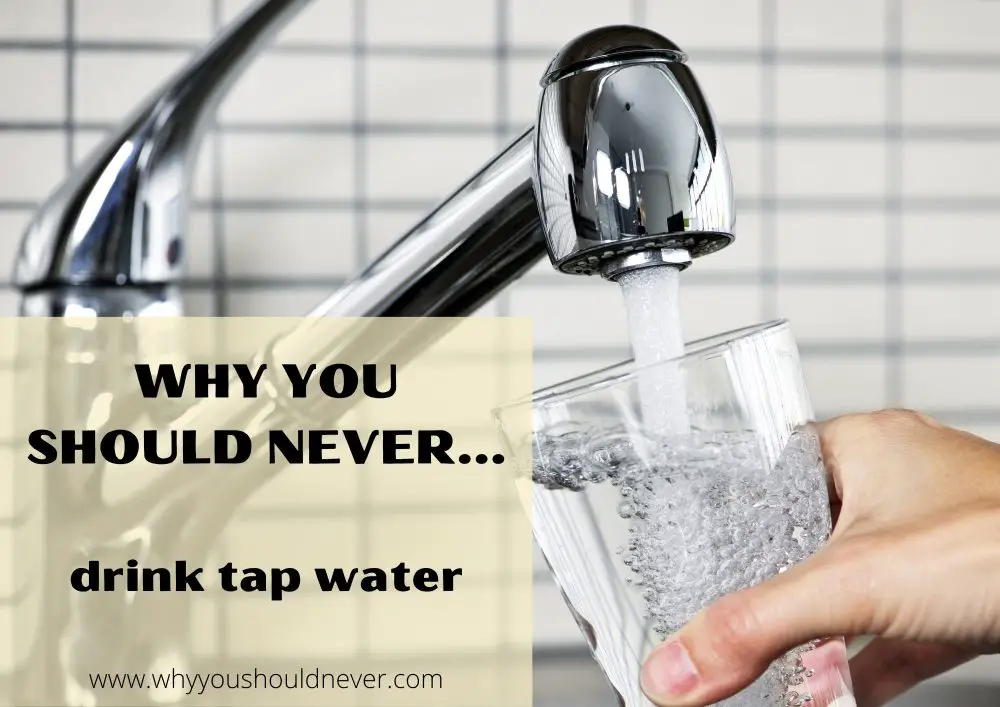![]()
Why You Should Never Drink Tap Water
We all know that we should be drinking more water. In fact, we’ve been told time and time again that water is essential for our health and well-being. But what we often don’t stop to think about is WHERE that water comes from.
According to a report by the Natural Resources Defense Council, in 2015, nearly 77 million Americans were served by contaminated water systems that violated the Safe Drinking Water Act.
So what does this mean for you and your family? It means that the water coming out of your tap could be loaded with all sorts of harmful contaminants that will, over time, make you sick. Yikes!
In this blog post, we’ll take a look at some of the most common contaminants found in tap water and explore what you can do to protect yourself and your family from their harmful effects. Let’s get started!
7 reasons why you shouldn’t drink tap water
1. Lead
Unfortunately, one of the most common contaminants found in tap water is lead. Lead is a metal that can leach into water through old pipes or solder joints. Once it’s in the water, it can be hard to remove completely.
Exposure to lead can cause serious health problems, including learning disabilities, behavioral problems, and even death. Pregnant women and young children are especially vulnerable to the harmful effects of lead exposure.
If you’re concerned about lead in your tap water, the best thing you can do is have your water tested by a certified laboratory. You can also install a reverse osmosis filtration system, which is highly effective at removing lead from tap water.
2. Bacteria
Bacteria are tiny microorganisms that are everywhere—including in our tap water. While some types of bacteria are harmless (or even beneficial), others can cause serious illnesses like cholera, dysentery, and typhoid fever.
Many people assume that boiling their water will kill any harmful bacteria present. However, boiling water does not necessarily remove all bacteria from the water; it only kills those bacteria that are heat-sensitive.
This means that there are still plenty of bacteria left behind that could make you sick. The only surefire way to remove bacteria from your tap water is to filter it with a reverse osmosis system or ultraviolet disinfection system before drinking it.
3. Pharmaceuticals
You might not realize it, but traces of pharmaceutical drugs can end up in our tap water as a result of sewage overflow or sewage treatment plants that aren’t functioning properly.
Although the levels of these drugs are low, they can still build up in our bodies over time and cause serious health problems.
Some of the most common pharmaceuticals found in tap water include antibiotics, hormones, antidepressants, and painkillers. Birth control pills and heart medication have also been found in tap water samples.
Naturally, you don’t want these drugs in your body—especially if you’re pregnant or breastfeeding.
4. Fluoride
Fluoride is a mineral that’s added to many types of toothpaste and mouthwashes because it helps prevent tooth decay—this is why it’s also added to some municipal water supplies (although this practice is controversial).
While fluoride isn’t necessarily harmful in small doses, too much fluoride can cause dental fluorosis (yellowing or streaking of the teeth), bone weakness, and other health problems—especially in children whose bodies are still developing.
5. Chlorine
Chlorine is added to municipal water supplies as a way to disinfect the water and kill harmful bacteria. Although chlorine is effective at doing this, it can also be harmful to our health in large doses.
Chlorine has been linked to an increased risk of cancer and reproductive problems, among other things. Additionally, the chlorine in tap water can dry out your skin and hair, and make it difficult to breathe.
6. Nitrates and nitrites
Nitrates and nitrites are chemicals that can leach into water from agricultural runoff or sewage overflows. These chemicals are especially harmful to infants, as they can cause a condition called “blue baby syndrome.”
Symptoms of blue baby syndrome include difficulty breathing, lethargy, and a bluish tint to the skin. If left untreated, blue baby syndrome can be fatal.
7. It just tastes bad
The reality is that, unless you’re living in Vienna, where the regular tap water is actually mineral water that comes straight from the Alps, chances are your tap water just tastes bad. This is because of all the chemicals and contaminants that are present in it.
Conclusion
If you’re going to be drinking something all day, every day, shouldn’t it be something that’s good for you and that tastes good?
Tap water is neither of those things. It’s full of contaminants that can harm you over time, and it just doesn’t taste very good.
Investing in a reverse osmosis filtration system is the best way to make sure that your water is clean and safe to drink. Not only will it remove all the harmful contaminants from your water, but it will also make it taste a whole lot better.
